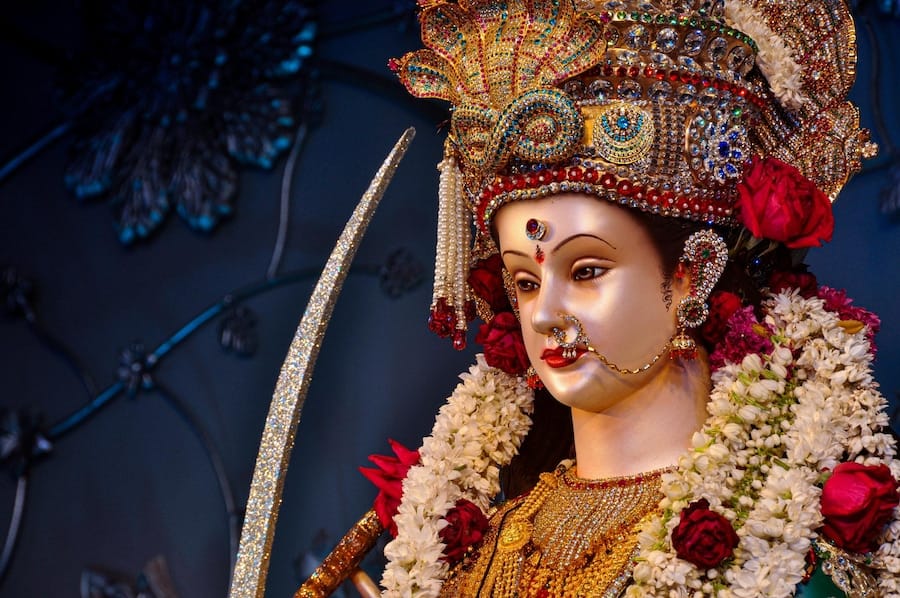Introduction:
Navratri is celebrated in India with grandeur and joy. These celebrations include a variety of sweets, Navratri fast recipes, and dandiya nights with friends and family. Navratri festival is celebrated four times during the year when seasons change. Out of the four Navratris, the Chaitra (Spring) and Sharad (Autumn) are more famous, while Magha (during winters) and Ashadha (Monsoons) are less popular.
Rich in colors, traditions, and dance, Navratri is also a time for us to relax, and recharge ourselves with new energy. It reduces the restlessness of the mind and brings forth awareness and joy. With Navratri festival right around the corner, a lot of us will be observing a fast (vrat). This means that we’ll be adjusting our food choices according to Navratri fasting rules. But why do devotees observe a fast? Is it primarily a religious belief, or is there more to it?
Navratris mark the onset of a new season, and therefore, a vrat is observed to make the body strong enough and flexible. By opting for a sattvic diet (foods without spices, oil, onion, garlic, meat, etc.) people strengthen their body and mind because a change of season brings along with it illnesses and diseases. Thus, by keeping Navratri vrat, people prepare to adapt themselves to the seasonal cycle.
“We fast not to please the Divine, but to cleanse our body.”
- Gurudev Sri Sri Ravi Shankar
Navratri Fasting Rules And Traditions
The fasting rules vary from region to region, but the common practice is to abstain from consuming non-vegetarian food, alcohol, grains, pulses, onion, garlic, and certain spices. Instead, people opt for a sattvic diet that includes fruits, nuts, dairy products, and specific fasting ingredients.
Apart from dietary restrictions, Navratri fast also involves certain rituals and practices. Many people observe a partial fast where they consume only one meal a day, while others may choose to consume only fruits and milk. Some people also observe a complete fast, abstaining from food and water for a specific period. Navratri fasting is seen as a way to detoxify the body, control the senses, and focus on spiritual growth.
Scroll down to know the myriad health benefits of Navratri fasting:
Helps In Detox
Apart from being an ideal time to connect with the spiritual self, Navratri is also the best time to detox and strengthen your body from within. We inhale and consume toxins in our day-to-day life either through food or living in a polluted environment. According to Ayurveda, fasting rekindles the digestive fire. An increase in the digestive fire burns the toxins in the body. Moreover, the fresh and light diet during Navratri boosts the immune system, flushing out toxins from the body, mucus, or any unwanted fecal matter.
When the toxins are flushed out of the body, it loses dullness and lethargy. All the cells of the body are rejuvenated. Fasting, therefore, is an effective therapy to cleanse our bodies.
Soothes The Digestive System
The digestive system is constantly working to break down foods and carry forward the process of digestion. While fasting, our digestive system gets a break and time to rest. By avoiding wheat, rice, and lentils, and embracing ingredients like Singhare Ka Atta, Kuttu ka atta, Sama, Sabudana, etc, people give the much-needed rest to their digestive system.
Calms The Mind
When the body is cleansed, the mind becomes calmer and more peaceful because of the deep connection between the body and mind. A study in 2003 found that fasting helps lower stress levels. Fasting leads to better cognitive health, reduction in oxidative stress reduces depression, and improves focus, and memory of the person.
Improves Overall Health
Fasting increases the production of HGH hormone (Human Growth Hormone) which is responsible for muscle growth, metabolism, increase in height, and reduction of weight. Fasting reduces the risk of heart diseases, reduces cholesterol, keeps the blood pressure in control, produces ketosis that improves blood sugar levels, and helps the body manage stress in a better way.
During these nine days, people opt for a variety of fruits and foods that are nutritious. The antioxidants present in these foods help in the removal of harmful free radicals from the body. When you fast, your liquid intake increases which help in keeping the body hydrated. During Navratri, most people have coconut water, fresh fruit juices, milkshakes, buttermilk, etc. that nourish the body and moisturize the skin.
Reap The Benefits Of A Sattva Bloom
Devotees who keep a vrat avoid the use of heat-generating spices such as Haldi (Turmeric), Dhania (coriander), Hing (asafoetida), Garam Masala (mixed exotic spices powder), Rai/Sarson (mustard), Lavang (clove), etc. They also avoid the use of sesame/mustard oil for cooking. Peanut oil or ghee are used for cooking vrat ka khana. Thus, by avoiding these and using Jeera (cumin) and kali Mirch (black pepper), people keep their bodies cool and refreshed.
Fasting coupled with meditation increases sattva - the quality of tranquility and positivity within us. An increase in sattva makes our minds more peaceful and alert. As a result, our intentions and prayers become more powerful. A sattva bloom also makes the body lighter and more energetic. We become more efficient. As a result, our desires manifest and our tasks get accomplished easily.
Plunge Into Deeper Meditations With Navratri Fasting
Navratri festival is the time to spend time with yourself, meditate, and connect with the source of existence. Meditation and prayers are significant parts of Navratri vrat. When fasting decreases the restlessness of the mind, it becomes easier for it to turn inwards and meditate. These help you in calming your senses, body, mind as well as soul. However, make sure that you eat sufficient amounts of fresh fruits and other sattvic food to keep yourself energized.
In a nutshell, by fasting during Navratri festival, one can exercise self-discipline, self-control, and last but not least spiritual awakening.
Note: Fasting is not recommended for certain body constitutions and health conditions. Therefore, it is advisable to consult a doctor before you fast. Also, keep in mind that you must fast only as much as you are comfortable.
Tips For Successful Navratri Fast
- Stay hydrated: Consume at least 3 liters of fluids on the days of the fast. Drink plenty of water, coconut water, herbal teas, buttermilk, and fresh fruit juices to stay hydrated during Navratri fast. Avoid packaged juices, cold drinks, and soda. They all have high amounts of added sugars
- Plan your meals: Prepare a weekly meal plan to ensure you have a variety of nutritious and delicious options for your fasting days. Start the day with a natural liquid, followed by 12-15 nuts and fruit. This will combat fatigue by providing energy, good fats, and antioxidants.
- Include protein-rich foods: Include dairy products like yogurt, paneer, and milk, along with nuts and seeds, to meet your protein requirements during fasting. Consume curd and low-fat milk, they’ll provide you with protein and calcium.
- Use healthy cooking methods: Opt for steaming, boiling, or grilling instead of frying to keep your meals healthy and light. Avoid deep-fried, high-starch meals such as potato chips, deep-fried sabudana vada, etc. Consume porridge, sabudana khichdi, or flatbread made with a mix of grains like sama millet, buckwheat atta (kuttu ka atta), and amaranth flour (rajgira atta).
- Practice moderation: While indulging in the festive delicacies, remember to practice portion control and eat in moderation. To prevent a sudden blood sugar spike at night, eat small snacks throughout the day rather than a big meal at night.
- Listen to your body: If you feel weak or dizzy during fasting, it's important to break your fast and eat something nourishing.
- For sweets, try to avoid sugar and jaggery if possible. Instead use dates, raisins, anjeer, and apricots as natural sweeteners.
- Replace table salt or processed/refined salt with Sendha Namak because it aids digestion, boosts immunity, and keeps the body active throughout the day.
- Try to consume raw, unprocessed foods when possible.
Takeaway:
Navratri festival is the best time to rejuvenate and refresh your mood with tasty foods, fasting practices, and prayers for 9 days. All this doesn’t mean that Navratri food can’t be delicious. We have sourced some delicious yet healthy recipes for you to try while fasting during Navratri 2023. So stay tuned for our upcoming blog on Navratri recipes to strike a balance between taste and health. This is not all, shop all your vrat and pooja needs for Navratri 2023 from our special collection!


0 Comment